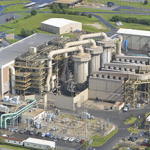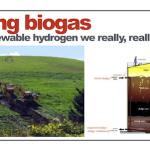Earnings Roundup: Metals Prices Boost Covanta and Umicore
By Tom Konrad, Ph.D., CFA
You don’t have to own mining companies to benefit from rising metals prices.
This is a roundup of first quarter earnings notes shared with my Patreon supporters over the last week. Waste to energy operator Covanta and specialty metals recycler Umicore are both benefiting from skyrocketing metals prices.
Just as renewable energy and energy efficiency stocks have long shown that investors don’t have to own fossil fuel companies to benefit from rising prices of fossil fuels, recyclers like Covanta and Umicore are showing that you don’t have to own environmentally damaging mining companies to benefit from rising...
Beyond ZEVs: The Negative Emission Vehicle
by Jim Lane
Wandering the halls at the BIO World Congress and later to be seen again at ABLC NEXT this November, we ran across one of the most interesting technologies relating to ethanol production and markets we have seen in a month of Sundays, perhaps two months’ worth.
The problem
First, let’s revisit the problem. There’s simply too much ethanol being produced for the markets to absorb, given the Trump Administration’s massive cutbacks in US ethanol targets —In the resulting massively oversupplied market, the inevitable has happened, ethanol producers, growers and the Midwestern economies are being crushed. And they thought they...
Hydrogen Fuel Is Not Dead
John Lounsbury With the furor over the potential for hybrid, plug-in hybrid and all-electric cars recently, one might think the hydrogen car was dead. Nothing could be further from the truth. Feasibility at an affordable price appears to be established and market availability of hydrogen powered cars may come sooner than you think. Many issues remain to be addressed and this article will try to cover them. The problems to be overcome are not insurmountable, but are also not trivial. These problems include the economics of hydrogen production, transportation, distribution and...
Making Hydrogen From Ethanol
by Debra Fiakas CFA Cars powered by fuel cells or batteries are only as clean as the electricity used to produce the power source. Proponents of hydrogen fuel cells argue that fuel cells have an edge over batteries, because hydrogen can ultimately be made cleaner with innovations in hydrogen production. Steam reforming of natural gas is the most common source of hydrogen and for the most part it is still the most cost-effective process for large-scale production of hydrogen. Since ethanol is a renewable resource, the steam reforming of ethanol has been proposed by some as...
There’s Hydrogen In That There Biogas
I don’t suppose that anyone actually dreams of hydrogen, but in the bio-economy there just isn’t quite enough of it and we read about it and sometimes think about it so much that we might as well be dreaming about it.
For those newer to the field, one of the problems of using biomass to make a fuel is that a carbohydrate contains around 53% oxygen by weight and needs about 16% more hydrogen that it contains to make a hydrocarbon fuel. That’s one of the reasons that biofuels are often esters (such as biodiesel) or alcohols (such as ethanol),...
Hydrogenics Awarded Contract to Supply Hydrogen Generators to China’s Largest Energy Companies
Hydrogenics Corp (HYGS) announced that it has received orders to supply electrolysis-based hydrogen generator plants to two of China's largest energy companies. China Electric Power Energy Group and China National Power have each purchased a HySTAT-A Hydrogen Plant, capable of producing 10 Nm3/h of high purity hydrogen at a pressure of 25 bar. In both cases, the hydrogen produced will be used to cool the generators in a coal-fired power plant. Delivery of both orders is expected to take place in 2006.
PEM Fuel Cells – Hoping to Challenge Internal Combustion
The first article in this series introduced the two prominent types of hydrogen fuel cells - alkaline fuel cells (ALKFCs) and proton-exchange membrane fuel cells (PEMFCs). Fuel cells are devices that convert stored hydrogen into usable energy, and constitute an essential part of the hydrogen economy. Subsequent articles shall focus on various characteristics of these two cells.
The graph above shows the power costs ($/kW) of PEMFCs and ALKFCs as the technology has advanced over time. In other words, they show the initial capital cost for every 1 kW of fuel cell capacity (note that this axis is in the...
Tesla Vs. Hydrogen
By Jeff Siegel One of Governor Arnold Schwarzenegger's dreams may soon be coming to fruition. During his time as governor, while singing the praises of renewable energy progress in the Golden State, the Terminator would often tell tree-hugging Californians about his dream of building a hydrogen highway that would enable hydrogen-powered vehicles to run from Mexico to Canada via California. Not only did Prius drivers and vegans applaud the governor's dream, but it even got a decent amount of support from former GM Chairman Bob Lutz and President George W. Bush. Since that time, California has managed to build...
Enbridge, Hydrogenics partner for utility-scale energy storage for renewables
Tyler Hamilton Oil and gas pipeline giant Enbridge Inc.(ENB) has invested $5 million in Mississauga, Ont.-based Hydrogenics (HYGS), a leading maker of proton-exchange membrane fuel cells and electrolysis systems for producing hydrogen gas from water. Gotta say, I wasn’t expecting this announcement. I know Enbridge has invested in fuel-cell technology before, and I know it has purchased hundreds of megawatts of solar capacity, operates wind farms and is dabbling in geopower. And yes, it has invested some money into Toronto-based Morgan Solar. What surprises me about...






